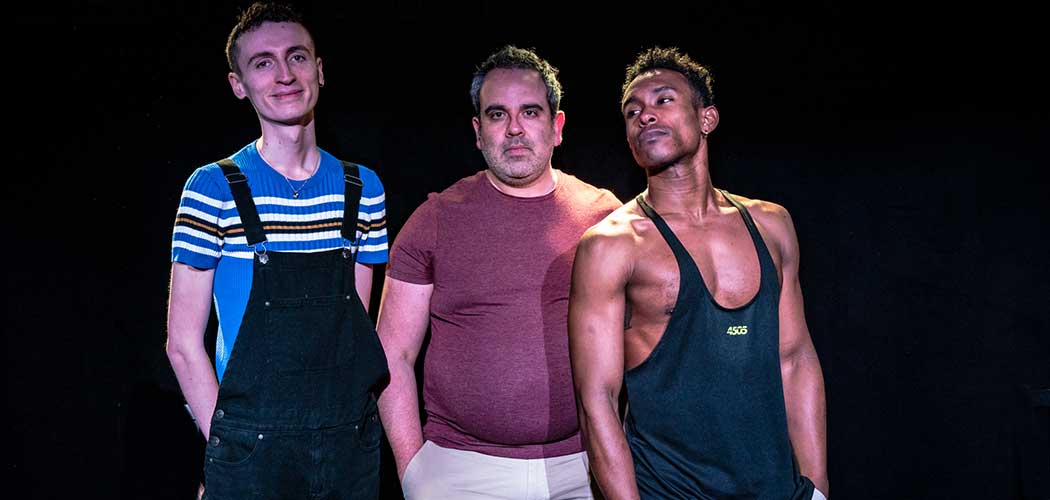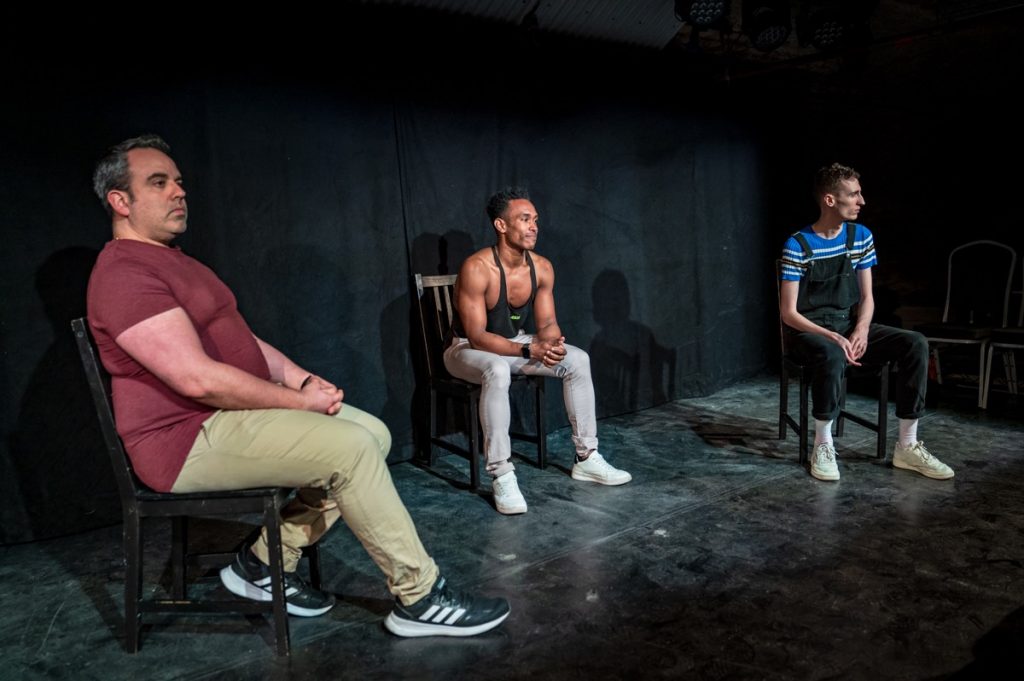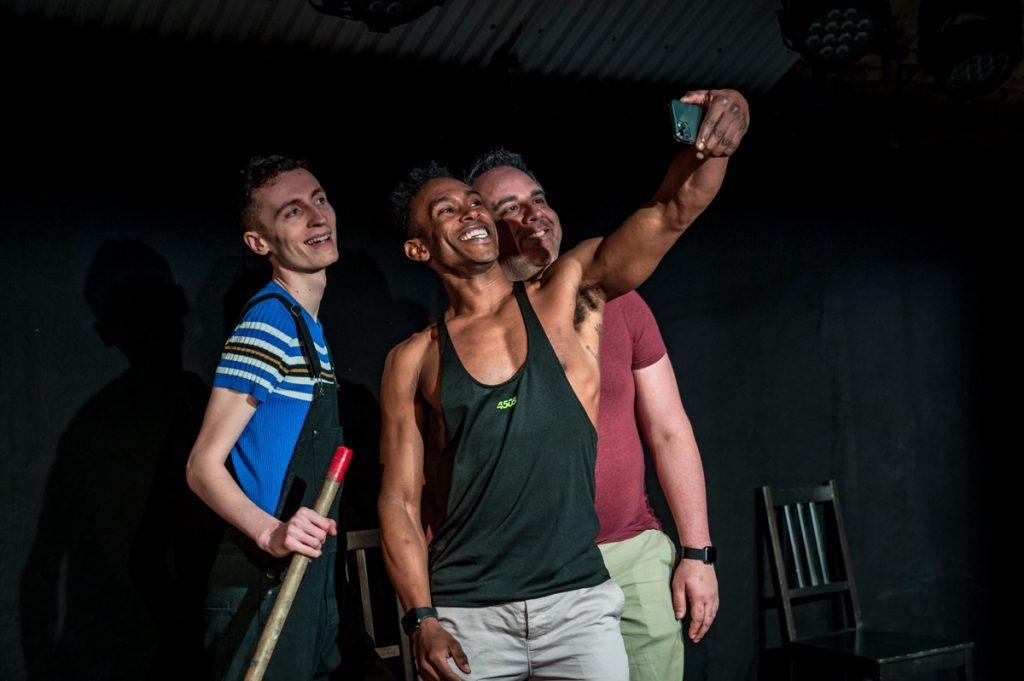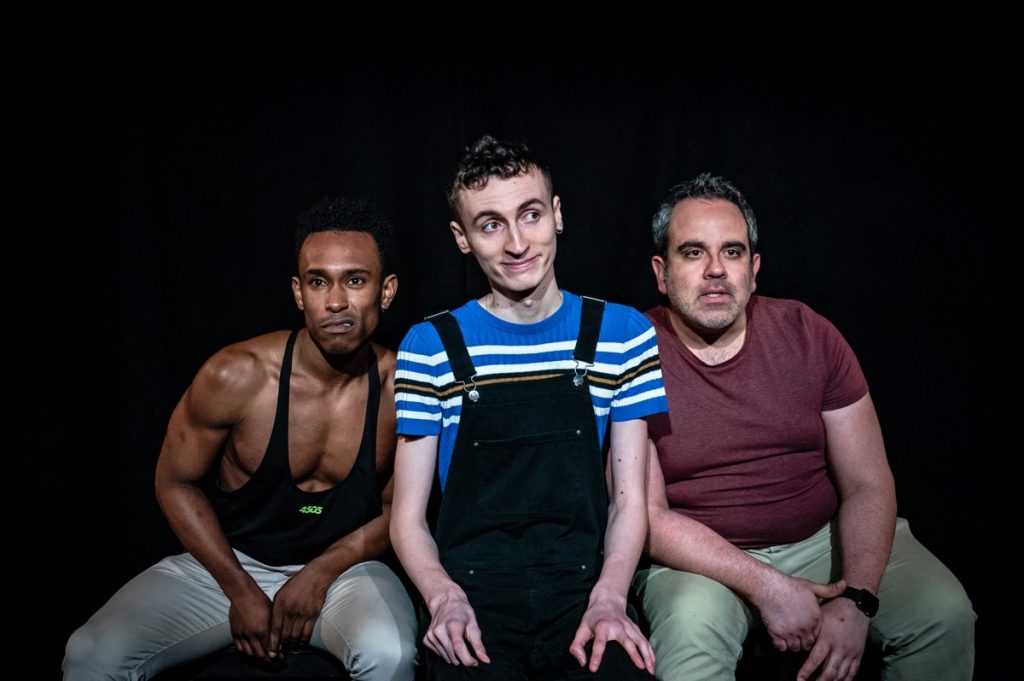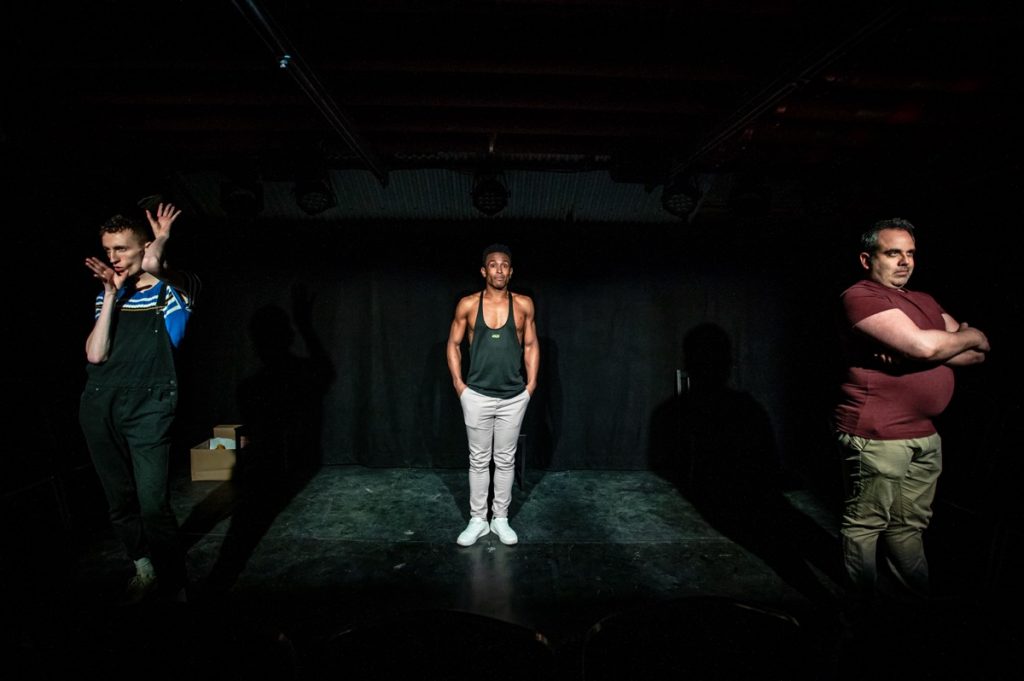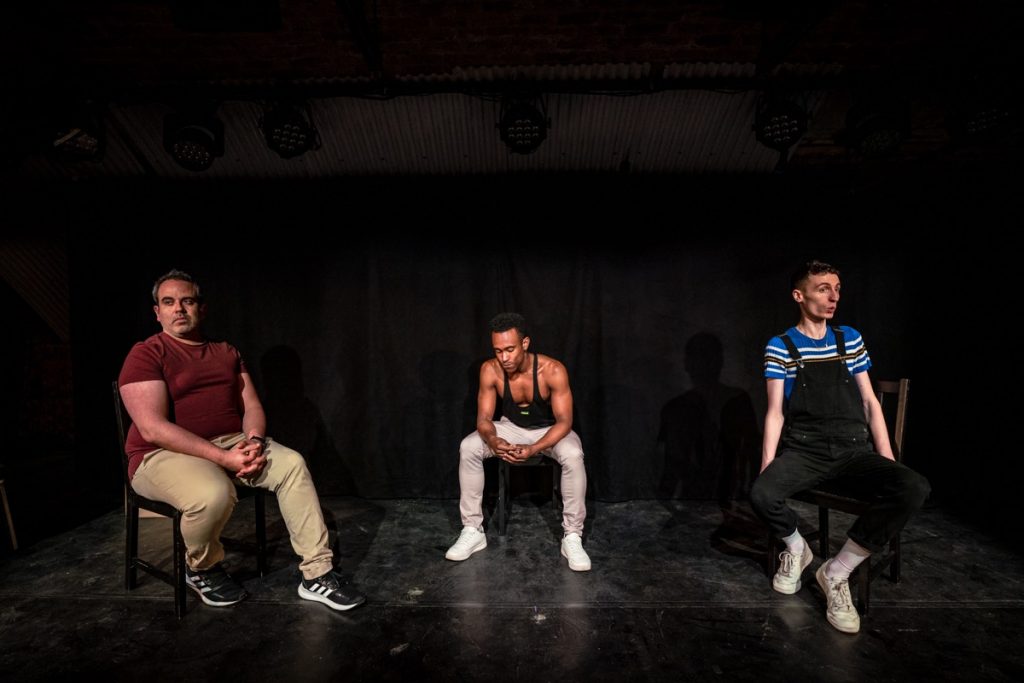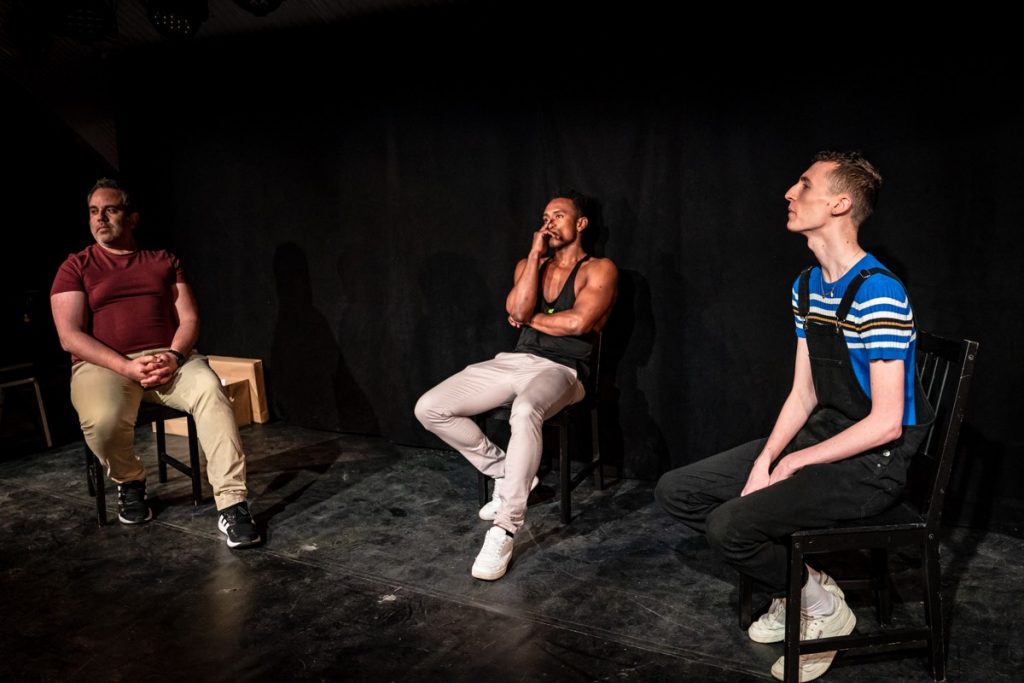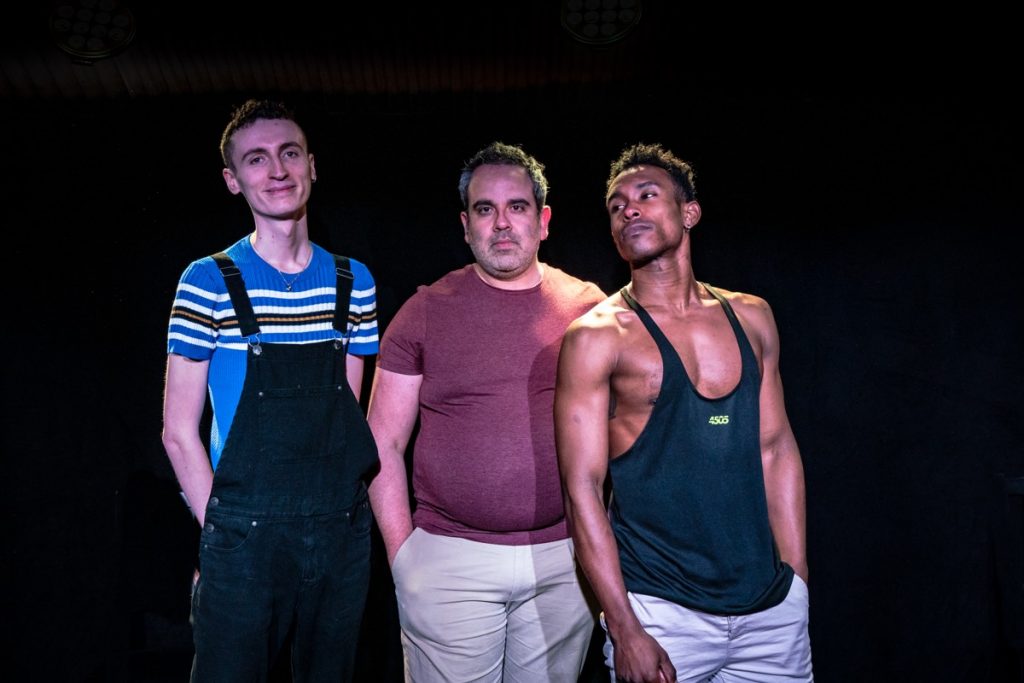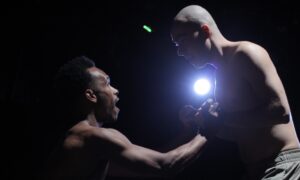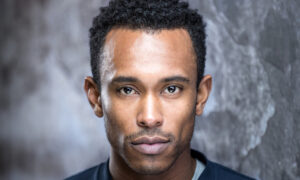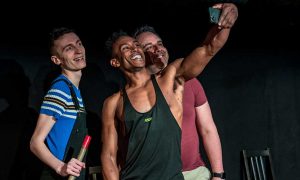Body Talk, a new play by writer David Hendon and produced by LGBTQ+ theatre company Full Disclosure, explores male body image and premieres in the opening week of the Vault Festival. We asked David to tell us more and invited the three actors – Mark Philip Compton (Phil), Dominic Jones (Carl) and Taofique Folarin (Cameron) – to describe their character’s relationship to their body image.
David, can you tell us what Body Talk is all about?
It concerns three gay men of different ages, each celebrating landmark birthdays and each suffering from different anxieties about their appearance. Carl is turning 21 but skinny and suffering from an eating disorder. Cameron is turning 30 and has a gym-toned body as well as a massive Instagram following but feels he can never be attractive enough. Phil is turning 40 and is overweight having let himself go due to a relationship break-up. Each character feels that they are lacking something because of how they look, and they come together in the story where one incident exposes how toxic it is to define yourself solely by how you look. We follow the fall-out from that and the path to finding happiness without obsessing about your image.
Can you tell us why you chose the three characters?
An important aspect of the play is that the characters are of different ages and therefore have differing experiences. So for instance, Phil was an adolescent during the 1980s at a time of terrible homophobia linked to the HIV/AIDS outbreak and he is still processing shame associated with that. Carl on the other hand is young but still struggling to find himself and his way in the world. I think the different ages make it interesting because characters who in ordinary life may avoid each other are forced together, and of course conflict is what drama is all about.
Why is it important we talk about body image in the LGBTQ+ community?
What’s changed is that social media has created an enormous pressure. Just like however rich you are, someone will always have more money, so it is that however attractive you are, someone will always look better. We are bombarded with images that are very hard to live up to. There’s a focus on looks and the self-worth that comes from looking good and sometimes the person behind that is forgotten. In the play we try and delve more into the characters as people to see who they are and what makes them tick. There’s also the perhaps uncomfortable issue of judgement within the community which needs to be aired and talked about.
Has social media had an impact on LGBT people’s attitudes to their body image?
The thing about social media is that it is a relatively new phenomenon but has been accepted as a normal part of life very quickly. It’s not so long ago that looking through someone’s private photo collection would have seemed prurient and intrusive. Now, there is no privacy. The danger is that it creates a scenario where nothing in your life is ever good enough, because there’s always someone out there online who looks better and is having a better life. Except, they may not be. Cameron in the play outwardly seems to have it all but is in fact cripplingly insecure. Spending hours in the gym isn’t the key to happiness if your only goal in life is to be admired for how you look. There must be a deeper reason driving you to that.
Can you tell us the story of how you created and developed Body Talk?
Chris and Sam from Full Disclosure run an amazing series of queer new writing nights called XPOSED and I wrote a play called Skin(ny) which was Carl’s story, which they included in one of the nights. I’d always intended to flesh out the idea to include three characters of different ages and after Skin(ny) received positive feedback we chatted about how this might work. I then wrote a draft of a longer script and we have worked on it together through various versions to get to Body Talk. A lot of it is based on the experiences of people I know, so hopefully this makes it feel realistic.
You are working with the Switchboard LGBT+ Helpline, is this an important partnership for you?
Switchboard offers an incredible support service for the LGBTQ+ community, with a telephone line, instant messaging and email service from 10am to 10pm, every day of the year. The play touches on many concerns around sexuality including shame, identity and loneliness. We wanted to ensure there was a safe place for those who came to see the play to talk openly about the issues raised and how this might affect them. Switchboard are the perfect starting point for those looking for a non-judgmental listening ear. Plus, making audiences more aware of the amazing work their volunteers do can only be a good thing.
Mark on Phil
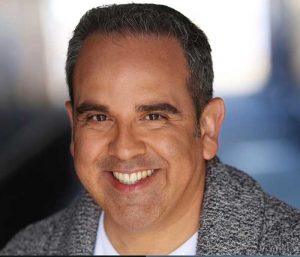
“Phil hides behind the weight he has put on and the body he now has. It is part of the wall he has built around himself to stop anyone getting close. It’s a security blanket that just exacerbates Phil’s insecurities and his lack of self-confidence. Phil is lonely and has always held himself aloof from making deep meaningful friendships or relationships because he is afraid of getting hurt, but at the same time creates scenarios where he becomes his own self-fulfilling prophecy.”
Dominic on Carl

“Carl is open and curious about finding where he fits into the world but his current coping mechanisms are crippling him. He struggles with his body image and self worth throughout the play. He knows he doesn’t have a body like the guys he follows on Instagram and feelings of inferiority follow him everywhere. Carl can’t see what a kind, loyal, optimistic person he is. He sees someone different in the mirror, and the play explores his shame and anxiety about his sexuality and its relation to the way he looks.”
Taofique on Cameron
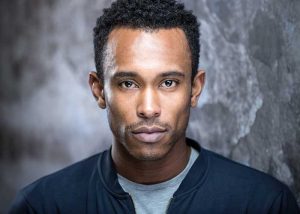
“Cameron is so much more than meets the eye. The perfect example why we should not judge a book by its cover. He is intelligent, charming and a romantic at heart. He is obsessed with his aesthetic and also Instagram. He strives for unobtainable body perfection, which leaves him to be continually anxious about his weight and appearance. Maybe he suffers with body dysmorphia where his perception of himself being fat is completely wrong. Cameron is a kind natured soul, whose naivety and insecurities could be his downfall.”
Production photos by Steve Gregson
Body Talks runs 29 January to 2 February at The Vaults, Leake Street, Waterloo, London SE1 7NN. Tickets from vaultfestival.com



